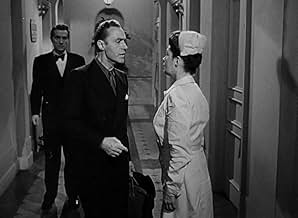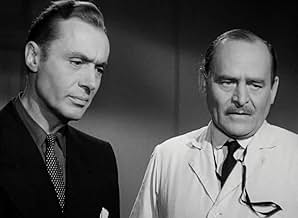IMDb RATING
6.3/10
2K
YOUR RATING
Illegal refugees lead dark lives in pre-World War II Paris.Illegal refugees lead dark lives in pre-World War II Paris.Illegal refugees lead dark lives in pre-World War II Paris.
- Awards
- 3 wins total
Richard Alexander
- Gestapo Agent
- (uncredited)
Sylvia Andrew
- Milan Charwoman
- (uncredited)
Frank Arnold
- Newsboy
- (uncredited)
Jessie Arnold
- Cashier
- (uncredited)
George Balooi
- Scheherazade's Waiter
- (uncredited)
Featured reviews
This could have been a much better movie. Boyer's disenchanted, vengeful refugee doctor is excellent and Bergman's Joan, unable to commit or disengage, could have been a fascinating characterisation. But while individual scenes are very fine, the film, as a whole, is oddly disconnected, suggesting ruthless cutting. The sub-plot involving Laughton's porcine Gestapo bully is perfunctory and we get far too much of Calhern's emigre. Still, the black and white photography is impressive, and I rather went for the doom and gloom!
The film tells about Dr. Ravic(Charles Boyer),he's an exiled living in Paris before the Nazis penetrate into the city.Under false name and with no papers,aware always that the Surete(French gendarmes)could be sent away or jailed.One day he sees to Haake(Charles Laughton) a Gestapo official who tortured his anterior love and he's looking for revenge.One night in a bridge over river Sena,the refugee doctor finds to Jean Madou(Ingrid Bergman),a beauty and mysterious gal and he rescues her from a suicide attempt.The 2ªWW isn't the best environment for romanticism and a love affair but he falls is love with her.
The film is a romantic melodrama with magnificent actors.However is slow moving and little bit bored .The casting is frankly magnificent.Charles Boyer as sad refugee and gorgeous Ingrid Bergman as unfortunate damsel in disgrace are excellent.The secondary cast is awesome, impressive Charles Laughton as Nazi official, one of the his usual roles as villain and the lion's share of the acting meat deservedly goes to Louis Calhern as an exiled Russian colonel of the Czar who's a doorman in a show-coffee. Atmospheric black and white cinematography by Russell Metty who later made colorful super-productions.The film was restored with longtime but going on tedious,sluggish and dull.The motion picture is regularly directed by Lewis Milestone who directed various classic warlike movies.The flick is based on Erich Maria Remarque novel and was posteriorly rendered for TV(1985)by Waris Hussein with Anthony Hopkins and Lesley Anne Down.The picture will like to Ingrid Bergman and Charles Boyer enthusiastic.
The film is a romantic melodrama with magnificent actors.However is slow moving and little bit bored .The casting is frankly magnificent.Charles Boyer as sad refugee and gorgeous Ingrid Bergman as unfortunate damsel in disgrace are excellent.The secondary cast is awesome, impressive Charles Laughton as Nazi official, one of the his usual roles as villain and the lion's share of the acting meat deservedly goes to Louis Calhern as an exiled Russian colonel of the Czar who's a doorman in a show-coffee. Atmospheric black and white cinematography by Russell Metty who later made colorful super-productions.The film was restored with longtime but going on tedious,sluggish and dull.The motion picture is regularly directed by Lewis Milestone who directed various classic warlike movies.The flick is based on Erich Maria Remarque novel and was posteriorly rendered for TV(1985)by Waris Hussein with Anthony Hopkins and Lesley Anne Down.The picture will like to Ingrid Bergman and Charles Boyer enthusiastic.
Lewis Milestone scored his greatest film success when he did the classic adaption of Erich Maria Remarque's novel All Quiet on the Western Front in 1931. It seemed a natural for him to do an adaption of another Remarque book, Flotsam, retitled here as Arch of Triumph. I guess that United Artists didn't want the audience to think the film was about sea refuse.
Unfortunately while All Quiet on the Western Front stayed very much on its anti-war message, Milestone opted to make one of those tragic romances that Frank Borzage was more noted for. The problem of all the refugees from all the political turmoil up to THAT time collecting in places like Paris was left very much in the background.
Charles Boyer is one of those refugees, a Czech who can't go back to his own country because of Hitler's bloodless takeover. He's a doctor who's been serving in Loyalist Spain and got run out of there. With no passport, he's an illegal alien in France in 1939 and subject to deportation which he is by the way at one point in the film.
He meets Ingrid Bergman who's also a refugee of sorts from a series of bad relationships. He saves her from suicide and a relationship develops. In fact when Boyer is deported, she does what she has to do to survive.
Louis Calhern may have the best role in the film as Boyer's friend and counselor, an exiled Russian Lieutenant Colonel of the Czar's guard who is a doorman at a swank Russian café. Charles Laughton is in here to as an S.S. officer who Boyer remembers killing his old girl friend back in Spain and who he hunts without mercy. Laughton has one of the smallest roles he ever did in a film and I wish there were more of him here.
Laughton is seen briefly at the beginning doing the torture in his best Inspector Javert manner. Later on when Boyer spots him and makes his acquaintance to lure him for the kill, he's an avuncular tourist, but clearly on some kind of mission. He's good in both sides of the same character.
It's a real downer of a film, Arch of Triumph. Good thing we know how history turned out because it sure doesn't look good for the good guys when this film ends.
Unfortunately while All Quiet on the Western Front stayed very much on its anti-war message, Milestone opted to make one of those tragic romances that Frank Borzage was more noted for. The problem of all the refugees from all the political turmoil up to THAT time collecting in places like Paris was left very much in the background.
Charles Boyer is one of those refugees, a Czech who can't go back to his own country because of Hitler's bloodless takeover. He's a doctor who's been serving in Loyalist Spain and got run out of there. With no passport, he's an illegal alien in France in 1939 and subject to deportation which he is by the way at one point in the film.
He meets Ingrid Bergman who's also a refugee of sorts from a series of bad relationships. He saves her from suicide and a relationship develops. In fact when Boyer is deported, she does what she has to do to survive.
Louis Calhern may have the best role in the film as Boyer's friend and counselor, an exiled Russian Lieutenant Colonel of the Czar's guard who is a doorman at a swank Russian café. Charles Laughton is in here to as an S.S. officer who Boyer remembers killing his old girl friend back in Spain and who he hunts without mercy. Laughton has one of the smallest roles he ever did in a film and I wish there were more of him here.
Laughton is seen briefly at the beginning doing the torture in his best Inspector Javert manner. Later on when Boyer spots him and makes his acquaintance to lure him for the kill, he's an avuncular tourist, but clearly on some kind of mission. He's good in both sides of the same character.
It's a real downer of a film, Arch of Triumph. Good thing we know how history turned out because it sure doesn't look good for the good guys when this film ends.
Paris, whether real or imagined, has rarely looked so spiritually and atmospherically gloomy on screen as it does in this underrated wartime romantic drama by Lewis Milestone. While the stark chiaroscuro black-and-white cinematography of the venerable Russell Metty certainly plays a hand in painting a bleak portrait of the refugee-laden French capital of the late 1930s, these conditions in the film are also derived from the fact that a good portion of it unfolds during many a rainy night. And it's under such circumstances that our protagonists—the hard-bitten, oft-deported Dr. Ravić (Charles Boyer), a victim of the Nazi regime when he was a member of the Austrian underground, and Joan Madou (Ingrid Bergman), a dispirited Italian-born cabaret singer—meet and eventually fall in love. However, this is neither the cutesy nor the heedless kind of love so often seen in lesser films. It is, rather, of the sort that takes place between two complex, multifaceted individuals who are world-weary, are aware of their strengths and weaknesses, and, most importantly in this case, know that they have little to no control over their impending future. Needless to say, both actors, who earlier worked together in George Cukor's Gaslight (1944), come through with strong, authentic performances; Bergman, especially, as her character grows the most and requires her to depict various shades. To its credit, the film's low-key, matter-of-fact approach isn't merely relegated to the love story; its political intelligence is equally sober and attentive. And the same could be said for Milestone's direction—he does not get many opportunities here to showcase his trademark camera movements. Adapted from a novel by German author Erich Maria Remarque, who also provided the source for Milestone's antiwar classic All Quiet on the Western Front (1930), this rich and engrossing film may have been ignored in its day but is bound to emerge triumphant sooner or later.
More people should know about this wonderful film--reading the book in advance really enhances the experience of it, but one can just enjoy the incredible performances of Bergman and Boyer (not to mention the excellent character roles, particularly Charles Laughton). The use of light/shadow is also extremely well done and atmospheric. It's high time someone re-releases this movie on DVD (Criterion, perhaps), because it's another wonderful example of classic film noir, very well executed.
For those not familiar with Remarque's novel, it's a must-read--although I warn you, after you're done you will have an insane urge to try Calvados.
For those not familiar with Remarque's novel, it's a must-read--although I warn you, after you're done you will have an insane urge to try Calvados.
Did you know
- TriviaThe rough cut of the film ran four hours. In reducing it to two hours, several actors were cut, including Ruth Warrick. She does appear briefly in the restored 133-minute version.
- GoofsWhen Ravic takes his gun and goes to look for Haake in the streets, the first shot of him has been reversed for some reason as evidenced by the signs he passes, which are backwards.
- Quotes
Joan Madou: He wanted to kill me. They always talk about it but they never do.
[laughs]
Joan Madou: You wouldn't want to kill me.
- ConnectionsFeatured in Legendy mirovogo kino: Charles Boyer
- SoundtracksLong After Tonight
(1948) (uncredited)
Music by Rudolph Polk
Music by adapted from the Russian folk song "Prochlada"
Lyrics by Ervin Drake and Jimmy Shirl
Sung by an uncredited singer dubbing Ingrid Bergman at the Scheherazade casino
- How long is Arch of Triumph?Powered by Alexa
Details
- Release date
- Country of origin
- Languages
- Also known as
- Arch of Triumph
- Filming locations
- Production companies
- See more company credits at IMDbPro
Box office
- Budget
- $5,000,000 (estimated)
- Runtime2 hours
- Color
- Aspect ratio
- 1.37 : 1
Contribute to this page
Suggest an edit or add missing content



































